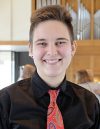- A Fellowships at Auschwitz for the Study of Professional Ethics participant reflects on the “Book of Names” exhibit at the Auschwitz-Birkenau Memorial and Museum. Photos: Carolyn Lawrence
- The entrance gate of Auschwitz I displays the phrase “Arbiet macht frei” (“Work sets you free”).
Have the gates of death been revealed to you, or have you seen the gates of deep darkness? (Job 38:17)
This verse reverberated in my soul during the apex of my time as a fellow with the Fellowships at Auschwitz for the Study of Professional Ethics (FASPE).
The day before the group relocated from Kraków to Oświęcim in Poland, I attempted to read through God’s answer to Job’s persistent questions in preparation for our visit to the death camps. But I couldn’t get past that 17th verse. The gates of Sachsenhausen, Auschwitz I and Auschwitz II-Birkenau were all different in shape and size, but they held one thing in common: they are the gates of deep darkness. And through this fellowship, they were revealed to me.
This year, I was honored to be chosen as a seminary fellow with FASPE. This fellowship includes medical professionals, journalists, lawyers, business leaders and seminarians. We studied our historical counterparts’ responses to the erosion of ethical norms in 1930s Germany and their complicity and participation in the crimes of Nazi Germany.
We began in Berlin, studying the growth of fascism and the many identity groups targeted and othered by the Nazi regime. We finished our program in Poland, visiting Kraków and finally Auschwitz II-Birkenau, the culmination of the degradation of ethics in German society.
While each fellowship group grappled and struggled with their professional field’s past, as a Lutheran, I was disturbed and shaken to the core of my faith identity. I felt revolted and physically ill to see the swastika imposed in the center of the cross, a symbol of the pro-Nazi German Christian movement in the 1930s. While I’m proud of the legacy of Lutheran theologian Dietrich Bonhoeffer, clergy resistance to the Nazi regime was scant and based more on opposition to the intrusion of the state into the church than on beliefs about the dignity of all human life.
It is my responsibility as a faith leader to bear witness to these crucified places and respond in action to the ethical issues of today.
During the first week of my fellowship in Berlin, I had hoped for an evening off to visit Wittenberg, the kickoff site of the Reformation, which was only an hour’s train ride away. But as I finished the fellowship and reflected on how Martin Luther’s writings were used to support the growing rise of anti-Semitism in Nazi Germany, I’m glad there was no time. I have no lost love for our founder, who advocated for the burning of synagogues.
Too often I have heard Lutherans dismiss or excuse Luther’s anti-Semitic writings as the fevered thoughts of an old and sickly man. Perhaps there are some Lutherans reading this who are unaware of his hateful and disturbing treatise “On the Jews and Their Lies.” But I will not abide erasing or side-stepping Luther’s sinful writings.
The ELCA repudiated and rejected Luther’s anti-Judaic works in 1994, and more must yet be done. We must reckon with our past.
I have seen the gates of deep darkness. My feet have rested on the site of a gas chamber where over 9,000 people with disabilities were murdered. My fingers have brushed against barracks where children were isolated and separated from their families, enduring lasting trauma years after the end of World War II. I have lain in grass beside pools of water mixed with the ashes of thousands. And I walked out of those gates when millions never could.
If I call myself a Lutheran, I must contend with all of Luther. It is my responsibility as a faith leader to bear witness to these crucified places and respond in action to the ethical issues of today. It is our responsibility to examine our history, beliefs and ideologies in light of our ethical and Christian imperative to serve and support the marginalized. We are freed as Christians to act against fascism, xenophobia, ableism and fear, proclaiming God’s love and justice.







